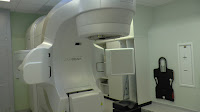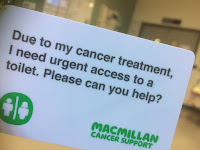 |
| Jo Lawrance cartoon |
Side effects
 |
| Radiotherapy machine; Rowan |
 |
| Ultrasound of bladder |
 |
| Card; gift to those having radiotherapy |
A friend lent me some of the Men’s Stay Dry pads; at one point was thinking I would need them but have managed to avoid so far. However I have them in the cupboard in case things change again.
Diet can also help; probably reducing my coffee intake might help but I can't take away that pleasure at the moment (iii).
Diet can also help; probably reducing my coffee intake might help but I can't take away that pleasure at the moment (iii).
My tip to others here is to reread the info given when you have any side effects or go to a site like prostate cancer or Macmillan (iv). I think I was believing so totally that I would get better in days I did not relook at the leaflets re side effects until the last couple of days - even reading them first time I was thinking I am not getting any of these, why am I reading this!
Post radiotherapy protocol
Well from my reading and talking with a Naturopath and others, a number of possible suggestions were made about how to support this first six weeks after radiotherapy. Again I note this may well be different for each of us as we will experience the radiotherapy differently; do also check everything you take to see how it might interact with medication or other supplements. I have already written about the supplements I am taking (i) and (v) but here is an updated list since ending radiotherapy:
Supplements continued
Probiotic x1 (where poss taken with raw veg)
Vitamin D 5,000IUs
Turmeric x2 tablets plus some in food
Selenium x1
Milk Thistle 15drops x3
Well from my reading and talking with a Naturopath and others, a number of possible suggestions were made about how to support this first six weeks after radiotherapy. Again I note this may well be different for each of us as we will experience the radiotherapy differently; do also check everything you take to see how it might interact with medication or other supplements. I have already written about the supplements I am taking (i) and (v) but here is an updated list since ending radiotherapy:
 |
| I finished my last bottle of this for a while |
Supplements continued
Probiotic x1 (where poss taken with raw veg)
Vitamin D 5,000IUs
Turmeric x2 tablets plus some in food
Selenium x1
Milk Thistle 15drops x3
Magnesium Citrate
Lecithin
Lecithin
Changes to protocol
Biostrath and Immiflex - I stopped these when I finished them just after the end of radiotherapy
Berberine - a friend said his functional doctor recommended ten days 4x 500mg of Berberine to help with bleeding after radiotherapy - I've taken this before and so I’m just completing two weeks of this. There is some research about this and radiotherapy (vi).
Homeopathy - listed previously - I stopped in last couple of days
D- Mannose I also stopped in last couple of days, but see below re more bladder support.
New supplements
Solidago Complex - there is some research showing that this herb has a potent antiproliferative effect against human breast, kidney and prostate tumor cell lines (vii). However I am taking it to support my bladder. The Vogel's Solidago Complex Drops (sometimes known as ‘waterfall drops’) are a combination of four herbs which work to strengthen kidney function, detoxify and prevent recurrent bladder infections; Solidago (Golden Rod), Birch, Horsetail and Restharrow. Solidago is basically a kidney tonic helping to combat infection of the urinary tract and remove toxins from the kidneys via the urinary tract. 15 drops x3 per day. I am also told that it works well with Milk Thistle.
UltraInflamX - this is an expensive 14 day course of easily digested powdered mix that provides nutritional support for individuals. The herbal extracts include turmeric, ginger, green tea and boswellia plus bioflavonoids and a full spectrum of nutrients. I was planning to start this two days after radiotherapy finished as I didn’t want to interfere with the treatment, however in the end it was a week before I started. Amazingly the next day after taking this, coincidence or not, I felt a shift in the inflammation symptoms and they got noticeably better. I suspect this supplement played a role in that.
 |
| Making up the UltraInflamX |
Chlorella - I had meant to start this powder sooner but my order got held up so only arrived a couple of days ago. Chlorella is a fresh water, single-celled algae that grows in fresh water - it was first around some 2 billion years ago when it was the first form of a plant with a well-defined nucleus. It contains the highest amount of chlorophyll of any known plant and is thought to boost the immune system and help fight infection. It is now used by some as an adjunct supplement during radiation treatment for cancer; it works by removing radioactive particles from the body after radiation treatment (ix). The suggestion is to take for two months and be aware that it can increase iodine levels - this can be good for some and a real problem for others.
Spirulina - while waiting for chlorella to arrive, I had some spirulina in the house and took that instead. Spirulina is a spiral-shaped, multi-celled plant with no true nucleus; it’s blue-green in colour and can grow up to 100 times the size of chlorella. I read that apparently during the Chernobyl disaster, a dose of 5 grams of spirulina for 45 days was used successfully in fighting radiation poisoning (x)! Many articles repeat the suggestion that it could be useful but I have found only a scattering of research to confirm. The good news is that it looks like it will do me good and does have very few side effects. Also like Chlorella it is anti inflammatory and boosts nutritional intake, but it is the chlorella that has the reputation for detoxification (xi).
Other actions and possibilities - rebuilding the gut
 |
| Finishing these powders to help rebuild gut |
Lastly I am continuing with regular exercise, meditation/visualisation, three saunas a week, shiatsu and healing every three or four weeks and started with my first rectal ozone yesterday since stopping due to the inflammation. I am also continuing with my nutrition protocol, although this slipped very slightly in recent couple of weeks as a sort to celebrate the end of the radiotherapy. I am still on the flaxseeds (taken ground and taken soaked in water), green tea drinks, turmeric, garlic and the ‘Rainbow diet'.
 |
| Celebrating end of Radiotherapy with a serious smoothie! |
Notes
(i) https://myunexpectedguide.blogspot.com/2020/03/radiotherapy-how-was-it-for-me.html
(ii)
https://www.macmillan.org.uk/cancer-information-and-support/treatment/types-of-treatment/radiotherapy/pelvic-radiotherapy/overactive-bladder-after-pelvic-radiotherapy
(iii) https://myunexpectedguide.blogspot.com/2019/07/coffee-good-or-bad-for-prostate-cancer.html
(iii) https://myunexpectedguide.blogspot.com/2019/07/coffee-good-or-bad-for-prostate-cancer.html
(iv)
https://www.macmillan.org.uk/cancer-information-and-support/treatment/types-of-treatment/radiotherapy/pelvic-radiotherapy/pelvic-radiotherapy-late-effects
(v) https://myunexpectedguide.blogspot.com/2019/11/increasing-effectiveness-of.html
(vi) https://www.ncbi.nlm.nih.gov/pubmed/19757213
(vii) https://www.sciencedirect.com/science/article/pii/S0102695X18302679
(viii) https://myunexpectedguide.blogspot.com/2019/01/current-supplement-protocol-for.html and https://www.readersdigest.ca/health/conditions/cancer-treatment-natural-supplements/
(ix) https://www.herbwisdom.com/herb-chlorella.html and
(v) https://myunexpectedguide.blogspot.com/2019/11/increasing-effectiveness-of.html
(vi) https://www.ncbi.nlm.nih.gov/pubmed/19757213
(vii) https://www.sciencedirect.com/science/article/pii/S0102695X18302679
(viii) https://myunexpectedguide.blogspot.com/2019/01/current-supplement-protocol-for.html and https://www.readersdigest.ca/health/conditions/cancer-treatment-natural-supplements/
(ix) https://www.herbwisdom.com/herb-chlorella.html and




No comments:
Post a Comment